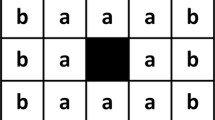Abstract
With the emerging mass production of very small, cheap Radio Frequency Identification (RFID) tags, it is becoming feasible to deploy such tags on a large scale. In this paper, we advocate distribution schemes where passive RFID tags are deployed in vast quantities and in a highly redundant fashion over large areas or object surfaces. We show that such an approach opens up a whole spectrum of possibilities for creating novel RFID-based services and applications, including a new means of cooperation between mobile physical entities. We also discuss a number of challenges related to this approach, such as the density and structure of tag distributions, and tag typing and clustering. Finally, we outline two prototypical applications (a smart autonomous vacuum cleaner and a collaborative map-making system) and indicate future directions of research.
Access this chapter
Tax calculation will be finalised at checkout
Purchases are for personal use only
Preview
Unable to display preview. Download preview PDF.
Similar content being viewed by others
References
Abelson, H., Allen, D., Coore, D., Hanson, C., Homsy, G., Knight Jr., T.F., Nagpal, R., Rauch, E., Sussman, G.J., Weiss, R.: Amorphous Computing. Communications of the ACM 43(5), 74–82 (2000)
Abowd, G.D., Battestini, A., O’Connell, T.: The Location Service: A framework for handling multiple location sensing technologies (2002), Available at www.cc.gatech.edu/fce/ahri/publications/locationservice.pdf
Akyildiz, F., Su, W., Sankarasubramaniam, Y., Cayirci, E.: Wireless Sensor Networks: A Survey. Computer Networks 38(4), 393–422 (2002)
Bohn, J., Vogt, H.: Robust probabilistic positioning based on high-level sensorfusion and map knowledge. Technical Report 421, Institute for Pervasive Computing, Dept. of Computer Science, ETH Zurich, Switzerland (April 2003)
Bulusu, N., Heidemann, J., Estrin, D.: GPS-less low cost outdoor localization for very small devices. IEEE Personal Communications Magazine 7(5), 28–34 (2000)
Coroamă, V., Röthenbacher, F.: The Chatty Environment – providing everyday independence to the visually impaired. Workshop on Ubiquitous Computing for Pervasive Healthcare Applications at Ubicomp 2003 (October 2003)
Elfes, A.: Using occupancy grids for mobile robot perception and navigation. IEEE Computer 22(6), 46–57 (1989)
Fairhurst, R., Jameson, B., Bolt, A., Brown, R., Slattery, M.: Geowiki – a map which you can annotate, Homepage at www.geowiki.com
Flörkemeier, C., Lampe, M.: Issues with RFID usage in ubiquitous computing applications. In: Ferscha, A., Mattern, F. (eds.) PERVASIVE 2004. LNCS, vol. 3001, pp. 188–193. Springer, Heidelberg (2004)
Goto, K., Matsubara, H., Myojo, S.: Amobile guide system for visually disabled persons. In: Proc. 4th Int. Symposium on Autonomous Decentralized Systems, March 1999, pp. 12–17 (1999)
Hitachi Ltd. Hitachi mu-chip - theWorld’s smallest RFID IC. Hitachi Mu-Solutions (2004), Homepage at www.hitachi.co.jp/Prod/mu-chip/
Kindberg, T.: Implementing physical hyperlinks using ubiquitous identifier resolution. In: Proc. 11th Int. Conference on World Wide Web, pp. 191–199. ACM Press, New York (2002)
Kubitz, O., Berger, M.O., Perlick, M., Dumoulin, R.: Application of radio frequency identification devices to support navigation of autonomous mobile robots. In: IEEE 47th Vehicular Technology Conference, May 1997, vol. 1, pp. 126–130 (1997)
Lampe, M., Flörkemeier, C.: The Smart Box application model. In: Ferscha, A., Hörtner, H., Kotsis, G. (eds.) Advances in Pervasive Computing, April 2004, pp. 351–356. Austrian Computer Society (OCG) (2004)
LEGO Mindstorms (2004), Homepage at http://mindstorms.lego.com
Ni, L.M., Liu, Y., Lau, Y.C., Patil, A.P.: Landmarc: indoor location sensing using active RFID. In: Proc. 1st IEEE Int. Conference on Pervasive Computing and Communications (PerCom 2003), March 2003, pp. 407–415 (2003)
Philipose, M., Fishkin, K.P., Fox, D., Hahnel, D., Burgard, W.: Mapping and localization with RFID technology. Technical Report IRS-TR-03-014, Intel Research December 2003
Rohs, M., Bohn, J.: Entry Points into a Smart Campus Environment – Overview of the ETHOC System. In: Proc. 23rd Int. Conference on Distributed Computing Systems - Int.Workshop on Smart Appliances andWearable Computing (IWSAWC), Providence, Rhode Island, USA (May 2003)
Sarma, S.E.: Towards the five-cent tag. Technical Report MIT-AUTOID-WH-006, MIT Auto-ID Center (2001), www.autoidcenter.org/research/MIT-AUTOID-WH-006.pdf
Super Distributed Objects Domain Special Interest Group (SDO DSIG). Request for Proposal: PIM and PSM for Super Distributed Objects. OMG Document sdo/02-01-04, Object Management Group (OMG) (2002), www.omg.org
Smith, M.: Duncan Davenport, Howard Hwa, and LikMui. The Annotated Planet:A mobile platform for object and location annotation. In: Proc. 1st Int.Workshop on Ubiquitous Systems for Supporting Social Interaction and Face-to-Face Communication in Public Spaces at UbiComp 2003, Seattle,Washington, USA, October 2003, Microsoft Research (2003)
Tuttle, J.R.: Traditional and emerging technologies and applications in the radio frequency identification (RFID) industry. In: IEEE Radio Frequency Integrated Circuits (RFIC) Symposium, June 1997, pp. 5–8 (1997)
Want, R., Fishkin, K.P., Gujar, A., Harrison, B.L.: Bridging physical and virtual worlds with electronic tags. In: Proc. SIGCHI Conference on Human Factors in Computing Systems, pp. 370–377. ACM Press, New York (1999)
HaoYuan, K., Hong, A.C., Ang, M., Peng, G.S.: Unmanned library: an intelligent robotic books retrieval & return system utilizing RFID tags. In: Proc. IEEE Int. Conference on Systems, Man and Cybernetics (SMC 2002), October 2002, vol. 4 (2002)
Author information
Authors and Affiliations
Editor information
Editors and Affiliations
Rights and permissions
Copyright information
© 2004 Springer-Verlag Berlin Heidelberg
About this paper
Cite this paper
Bohn, J., Mattern, F. (2004). Super-distributed RFID Tag Infrastructures. In: Markopoulos, P., Eggen, B., Aarts, E., Crowley, J.L. (eds) Ambient Intelligence. EUSAI 2004. Lecture Notes in Computer Science, vol 3295. Springer, Berlin, Heidelberg. https://doi.org/10.1007/978-3-540-30473-9_1
Download citation
DOI: https://doi.org/10.1007/978-3-540-30473-9_1
Publisher Name: Springer, Berlin, Heidelberg
Print ISBN: 978-3-540-23721-1
Online ISBN: 978-3-540-30473-9
eBook Packages: Springer Book Archive




